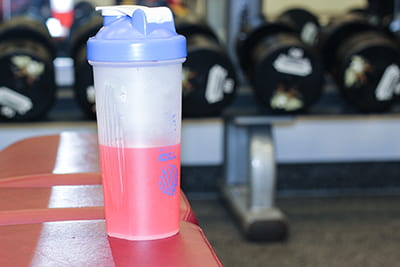 Eating healthy can be challenging in our busy lives, especially when you factor exercising into the equation. People often use supplements to help “balance” their nutritional intake.
Eating healthy can be challenging in our busy lives, especially when you factor exercising into the equation. People often use supplements to help “balance” their nutritional intake.
Although supplements are convenient and can provide a boost to exercise performance, the overall cost and unlisted ingredients should be of concern.
GOOD
Convenience: Supplements offer convenience when you have a bad nutritional day. A multivitamin is a can provide the necessary vitamins and minerals lacking from your daily nutritional intake. Protein powders offer an easy way to increase protein intake by adding a scoop to a smoothie, pancake/waffle or muffin mix. 1 scoop of protein can add 15 to 26 g of protein depending on the brand/kind.
Performance: One of, if not, the main reason as to why most individuals that purchase supplements are for some sort of performance enhancement. Supplements help with recovery, strength, intensity and focus. Branched chain amino acids, the building blocks of protein (plug article previously written) can be taken separately or found in protein powders. Research has shown that BCAA’s, specifically leucine, increase the rate of muscle protein synthesis. Pre and post workout supplements contain various ingredients that improve mental alertness/focus (caffeine), fatigue resistance/recovery (citruline malate) and intensity (creatine).
BAD
Cost: The cost of supplements can vary. Designer supplements like pre-and post-workout formulas can get expensive. A long list of ingredients and flashy packaging can drive the price up on some relatively inexpensive ingredients. If you are on a budget but still would like to buy supplements whey protein supplements on a cost/serving and cost/g or protein is comparable with cheap food sources. Eggs are the gold standard for protein sources. The protein content is 6 g for a large egg. Egg prices vary but the cost per gram of protein works out to be around 0.23 cents divided by 6 g to get approximately $0.038 cost/g protein. Whey protein powders work out to around $1.25 per serving and $0.052 cost/g of protein. Compare the cost/g with other supplements to other cheap high protein sources such as fish, chicken, soy, peanut butter etc. to see if you are spending too much money on supplements.
Unlisted ingredients: This may not apply to everyone, but someone who is in amateur or professional sport may have to consult the governing body on sport ethics to see if a supplement may contain a banned substance. The Canadian Centre for Ethics in Sport states the following:
“Unlike food and pharmaceutical production, the supplement industry is subject to little government regulation. Consequently supplements may:
- Intentionally contain prohibited substances;
- Unintentionally be contaminated with prohibited substances (e.g., contaminated source ingredients, erroneous source ingredients, cross-contamination during manufacturing); or
- Be mislabeled.
In addition, supplements may:
- Not accurately list the ingredients (e.g., falsify, omit);
- Not accurately list the relative amounts of each ingredient per dose;
- Make false certification claims (e.g., WADA-approved);
- Make false health benefit claims; and
- Not list important cautionary information (e.g., side-effects to health).
The number of anti-doping violations resulting from the use of supplements demonstrates the extreme risk an athlete runs when using supplements. A positive test for an athlete who uses supplements may result in a violation regardless of how the prohibited substance got into their body. Serious sanctions may be imposed.”
Again, if you are unsure about a supplement contact the governing board and check the banned substance list to avoid any repercussions.
Remember supplements are not intended to replace a properly balanced diet.



